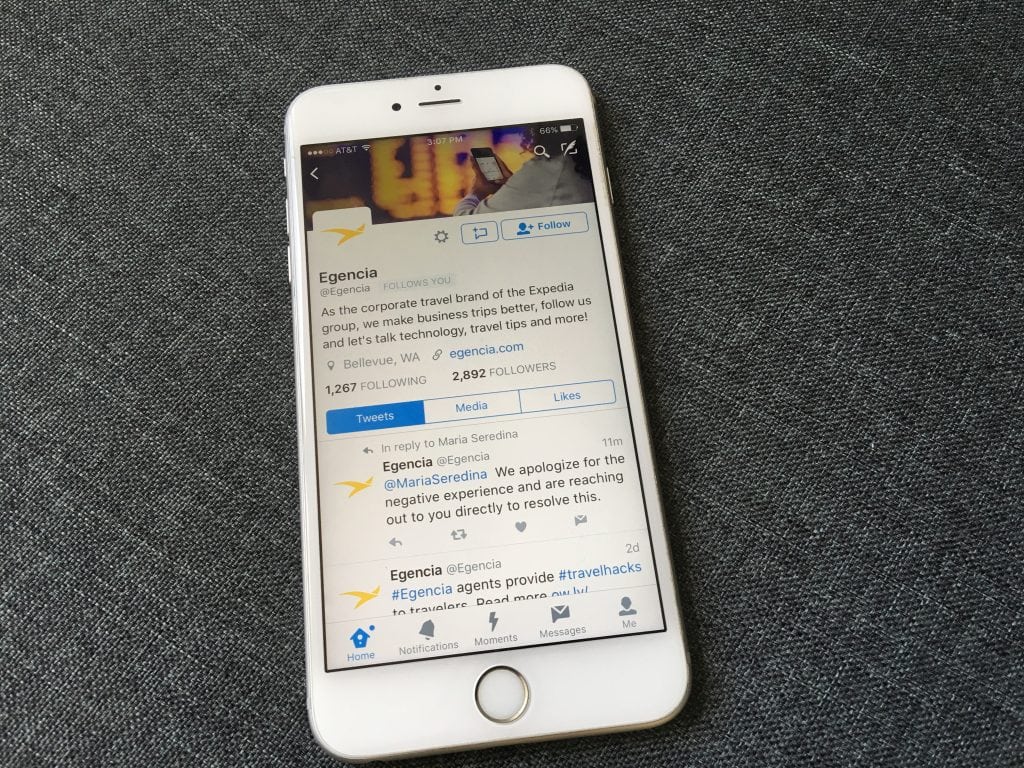Skift Take
What happens when your social media operations have to transcend the traditional silos of B2B and B2C? Travel management companies are figuring it out in a very public forum.
When it comes to serving customers on social media, travel companies are usually responsive to complaints and providing advice when world events affect travelers.
Travel management companies, however, aren’t known to have embraced social media as a forum for interacting with customers in a manner similar to consumer travel brands, for a variety of reasons.
A look at the Twitter and Facebook accounts of the top travel management companies shows that the global scope of their operation makes it hard to create a cohesive identity on social media. Balancing global branding with local insights is a steep challenge.
Overall, it looks like travel management companies have a long way to go on social media when compared to leisure brands. Many posts are blatantly self-promotional instead of being geared towards providing value to followers.
Want to know the benefits of #StrategicMeetingsManagement ? Find out now: https://t.co/Iz4G4p6yln
— Carlson Wagonlit (@CarlsonWagonlit) August 11, 2016
Other accounts are simply underdeveloped or strangely positioned; American Express Global Business Travel Israel, for instance, has a more full-fledged Facebook presence than American Express Global Business Travel itself.
Egencia, as the corporate travel arm of travel technology giant Expedia Inc., seems to be forging an online presence with lessons learned from leisure-facing brands.
“We balance the proactive Egencia brand campaigns and some concierge content, which is not necessarily what you would expect from a B2B brand,” said Ashley Keller, Egencia’s senior global marketing communications manager. “What are [our travelers] thinking about, and feeling, from point A to point B. It’s just not the moments they have to hit while traveling, it’s all the gray space in between.
“Our Facebook is primarily employee-based, it’s a lot more about what is going on within the company, whereas with Twitter we take in questions or comments from a customer service perspective. We’ll respond to them via DM (Direct Message) and have a distribution list to travel consultants so it’s a direct throughput.”
#Egencia agents provide #travelhacks to travelers. Read more https://t.co/vajH7zzluQ
— Egencia (@Egencia) August 19, 2016
Keller manages Egencia’s social media presence, and says it’s a priority to make sure her content is relevant to the many different parties that may turn to the company’s accounts.
It’s more about brand identity and utility than customer service, unlike the leisure space.
Egencia, for instance, negotiated a deal with risk management firm red24 to provide information on emerging world events for its social media accounts.
“If you’re a global, multiple point of sale traveler, you’re less likely to spill into social channels unless you’re extremely frustrated, but we can field inquiries from companies that don’t have the [travel management] resources, or that contact is wearing so many hats they go into our team help environment or contact us through social,” said Keller. “It kind of depends on what their internal resources are.”
A challenge is that when it comes to corporate travel, personal and professional lives tend to overlap. Most travel management companies also have offices around the world serving clients based on their region, so a one-size-fits-all approach to social media content isn’t always suitable.
“Is [our content] adding value?” asks Keller. “The two audiences are travel managers/arrangers and the folks on the road. Right now we have a global strategy across the company, but we do have more local execution. You’ll see consistent threads and common campaigns, but there’s also topical, zeitgeist things for them to tap into so that’s where we have more balance to think global and act local.”
This hasn’t, however, kept these companies from experimenting.
BCD Travel, for instance, operates an Instagram account featuring inspirational photos and snaps from employees on the road in addition to the usual Twitter and Facebook accounts.
“Our overarching communication strategy seeks to connect with people using the channels and methods they prefer, whether that’s through social channels or more traditional means,” said Thad Slaton, BCD Travel’s senior vice president of marketing.
“We’ve found that corporate travel professionals, like everyone else, use specific social media channels for distinct purposes, so we’re active in multiple channels and always re-assessing how and where we communicate. For example, people tend to use LinkedIn for professional networking and career development, Twitter to flag content that interests them and to start conversations, and Facebook to engage less formally with broader audiences.”
The Daily Newsletter
Our daily coverage of the global travel industry. Written by editors and analysts from across Skift’s brands.
Have a confidential tip for Skift? Get in touch
Tags: bcd travel, egencia, social media
Photo credit: Travel management companies are still figuring out the right way to represent themselves on social media. Egencia's Twitter account, pictured, treads the line between B2B and B2C content. SKIFT
